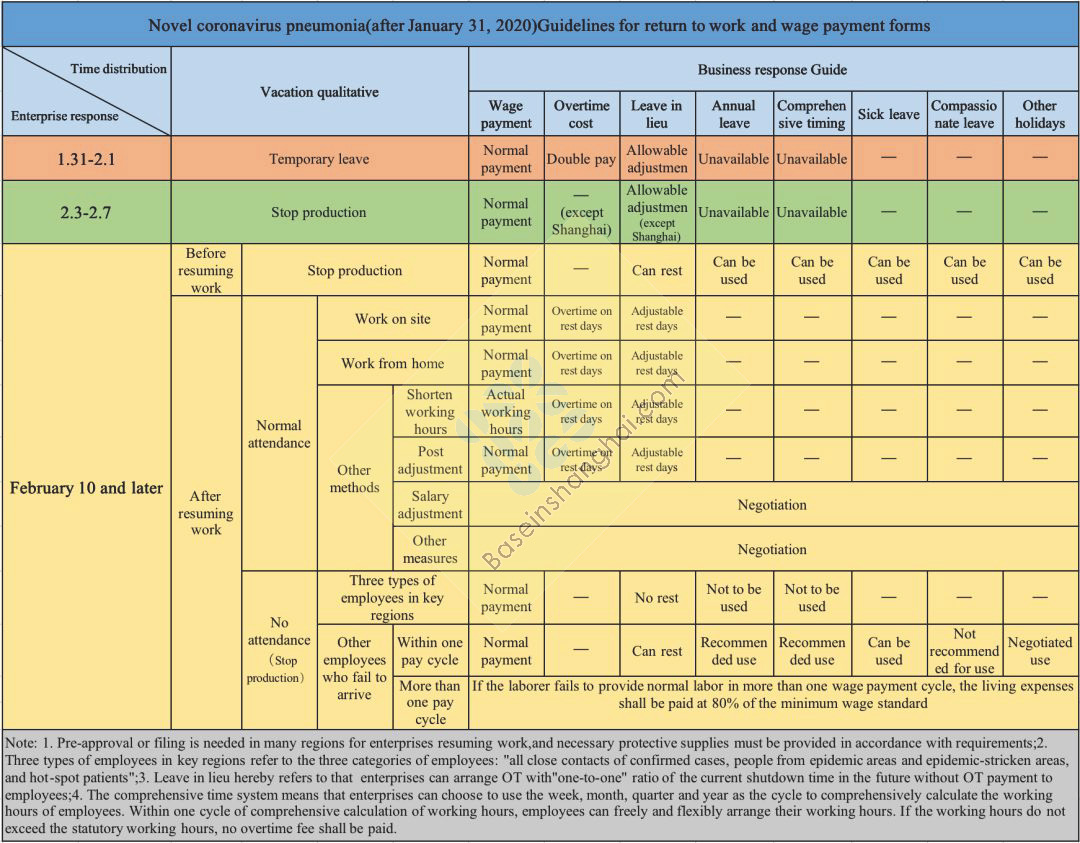Contents
During the outbreak of the “Novel Coronavirus Pneumonia”, the State Council and other localities successively issued regulations on enterprises’ “delayed resumption of work”. According to the author’s rough statistics, “delayed resumption of work” basically ended at 24:00 on February 9, 2020. However, from the current actual situation, after February 10, 2020, many enterprises still cannot start work normally, and many employees have not been fully in place. This article tells you the Guidelines for return to work and wage payment After Covid-19 in China.
Then during the epidemic of “NCP”, how to treat and deal with employees who have not resumed work after February 10, 2020, and how to make reasonable and legal choices is not only in the company’s own interests but also beneficial to employees and What is the current situation in the fight against “NCP”?
According to Notice by the General Office of the Ministry of Human Resources and Social Security of Issues Concerning Properly Handling Labor Relations during the Prevention and Control of the Outbreak of Novel Coronavirus Pneumonia (No. 5 [2020] of the General Office of the Ministry of Human Resources and Social Security), and Opinions on Stabilizing Labor Relations and Supporting Production Resumption by Enterprises During the Period of Epidemic (No. 8 [2020] of the General Office of the Ministry of Human Resources and Social Security), our team makes a basic judgment on the nature of each short holiday according to the provisions of the law and makes the statistical table as follows according to the provisions of the relevant laws:
Guidelines for return to work and wage payment forms
Novel coronavirus pneumonia (after January 31, 2020)
4 items of Wage payment to be noted
1. Pre-approval or filing is needed in many regions for enterprises resuming work, and necessary protective supplies must be provided in accordance with requirements;
2. Three types of employees in key regions refer to the three categories of employees: “all close contacts of confirmed cases, people from epidemic areas and epidemic-stricken areas, and hot-spot patients”;
3. Leave in lieu hereby refers to that enterprises can arrange OT with”one-to-one” ratio of the current shutdown time in the future without OT payment to employees;
4. The comprehensive time system means that enterprises can choose to use the week, month, quarter and year as the cycle to comprehensively calculate the working hours of employees. Within one cycle of comprehensive calculation of working hours, employees can freely and flexibly arrange their working hours. If the working hours do not exceed the statutory working hours, no overtime fee shall be paid.
Laws and regulations
It is worth emphasizing that after February 10, 2020, if the enterprise is in a state of shutdown or shutdown or the employees (the employees who are not affected by the virus) are unable to attend normally, the relevant regulations of “shutdown and shutdown” should be followed. Meanwhile, according to the provisions of the second paragraph 1 of Opinions on Stabilizing Labor Relations and Supporting Production Resumption by Enterprises During the Period of Epidemic(No. 8 [2020] of the General Office of the Ministry of Human Resources and Social Security), the enterprise can also fully consult with employees in a normal payment cycle (February 10, 2020, and beyond), and use annual leave, one to one, and enterprise to make a break. Welfare holidays, comprehensive working hours, and many other ways, through a difficult time to return to work.
Authors:
Oscar CUI, Senior Partner of Xinben Law Firm, senior lecturer, master tutor of International Finance Law school in ECUPL, mediator in China Council for the Promotion of International Trade/China Chamber of International Commerce, guest lecturer of Ministry of Commerce Training Center and MBA Education Center in ECNU, member of Enterprise legal Advisory Committee of Shanghai Bar Association and Company Law Professional Committee of Shanghai International Business Law Research Association.
Rock MA, Senior Partner of Xinben Law Firm, qualified with SAC, American Certified Fraud Examiners and Forensic Certified Public Accountant. He has rich working experiences in the Ministry of Public Security of PRC and multinational financial groups such as Standard Chartered Bank and American Express in the area of financial crime investigations, internal control, risk control and anti-fraud, anti-corruption and other related legal affairs.




